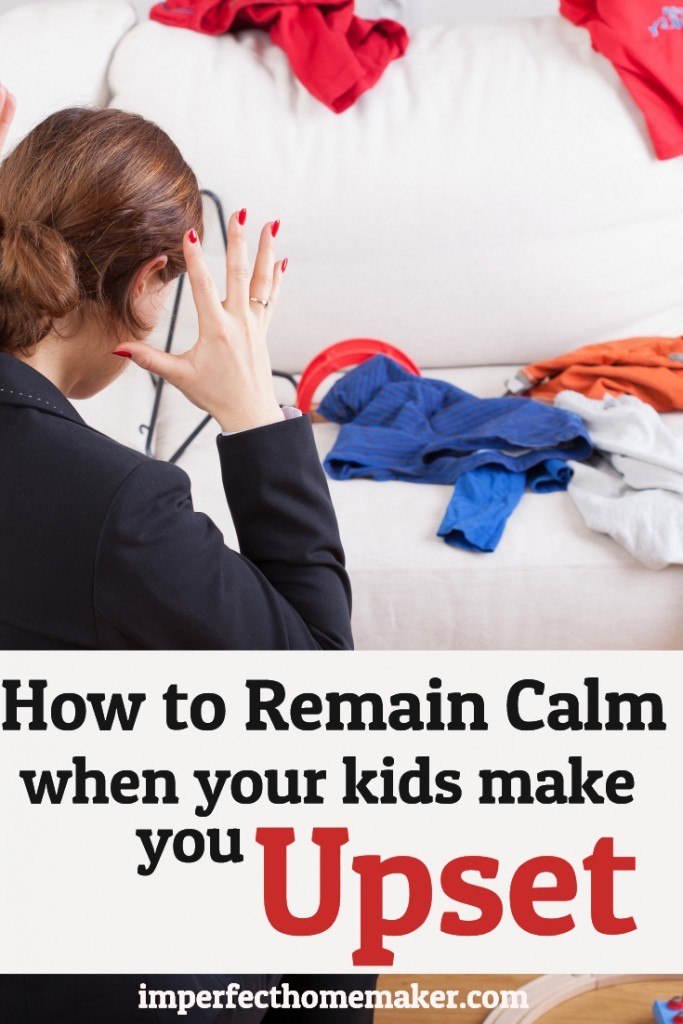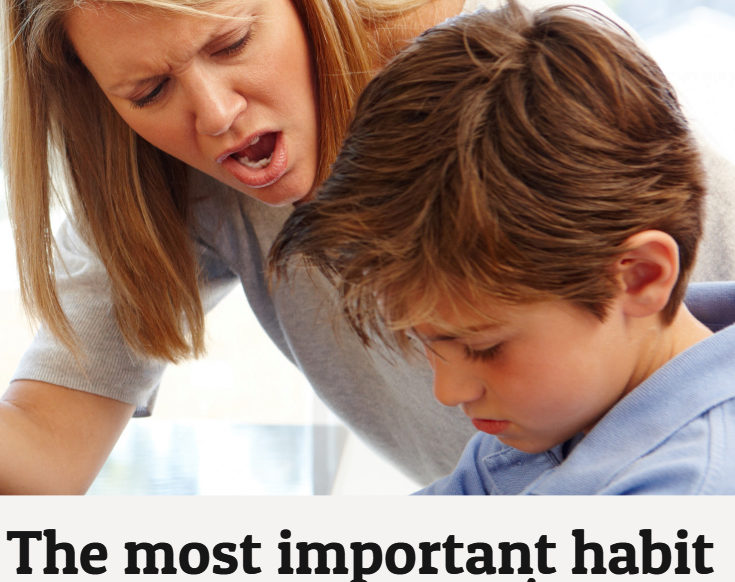One Thing to Teach Your Kids That Will Help You Be a More Gentle Parent
“Mommy, look at my picture!” “Mom, do you know where my book is?” “Mommy, can you braid my hair?”
Mom, Mom, Mommy, Mom, Mommy, Mom!
It was a caucaphony of sound, and my head was spinning as I tried to process all of the words that were being thrown my direction.
Thankfully, my husband was nearby to save me because I couldn't even think quickly enough to remind them not to interrupt one another.

He stated simply and calmly, “Hold it kids. You're all being rude to one another and rude to your mom.” Then he turned to me. “Why don't we demonstrate for them so they can get a better understanding of what they're doing and why they need to stop.”
So we both started talking at once to one of the children, each trying to talk over the other. Her eyes got wider and wider as she experienced what it was like to try to process all the noise and commotion.
She understood very quickly, as did the rest of the children, exactly how I felt when they were all talking at once to me.
“I can't even hear what you're saying!” she wailed.
“Yes. Now you understand how your mother feels when all of you are trying to talk to her at once,” he gently told her. “No wonder she feels like screaming ‘STOP IT!' when you're all talking at once. Do you see why you need to wait when someone else is speaking? You all have been thinking only of yourselves instead of putting others first. It's rude to interrupt, both to the person you are interrupting and the person to whom you are both speaking.”
We could have allowed the kids to continue talking all at once until I finally got to the place where I did yell, “STOP IT!”
And I could have become extremely frustrated when they continued to behave this way day after day, driving me to many more yelling moments.
But now that they understand the “why” behind the no interrupting rule, they will remember it a whole lot better. And I won't have to deal with the temptation to holler at them when they forget.
We parents often forget the teaching aspect of parenting and go straight to the discipline.
Or we fail to teach them ahead of time and our teaching is done gruffly and out of frustration.
The above scenario could have played out much differently had my husband not been around. It could very well have been a “teaching moment” of “BE QUIET! Don't you know it's rude to talk all at once and interrupt each other!!!”
And then they wouldn't have actually learned anything other than, “I guess we'd better be quiet now because mom's mad.”
And mommy would go feel guilty because I just tried to teach my kids not to be rude by yelling at them. Mmmhmmm.
But now that they've been taught why they shouldn't interrupt, the next time they forget, I don't have to say anything other than, “Wait a second. Remember how it felt when mommy and daddy were interrupting each other and talking all at the same time?” And that's probably all I'll need to say before they correct themselves.
I'm now empowered to deal with interrupting in a much more gentle way, all because daddy took a few minutes of teaching time to help them understand why interrupting is rude.
Explaining “why” isn't going to be the right answer in every situation, especially with very young children who won't understand anyway.
But once our children get a little older, explaining why they should and shouldn't do certain things can actually be a big asset to your efforts to be a more gentle parent.
(Not to mention, it will help your children learn to do right because it's right and not because they are little robots, mindlessly doing the will of their parents. What will they do when you're not around to “program” them if that's the case?)
If you're looking for a good resource to guide in teaching your children the “why” behind what they do, I recommend this little study called “Because I Said So“. It's a Biblically based study for kids that will help them to see from Scripture why they should obey.
If you want to be a more gentle parent, don't be afraid to teach your children “why”.
This post is part of the Parenting With Gentleness Series.
How to Quit Being Annoyed When Your Kids Interrupt Your Plans
I'm sitting in Chick-fil-A, enjoying my meal, when my toddler pipes up, “I need to go potty!”
Or I'm sitting at the computer early in the morning, happy that I'm up early enough to get in a little bit of writing before the kids wake up, when I hear little footsteps coming down the hallway.
Or I'm sitting outside, reading a book while my kids play, but they keep calling to me, “Mommy, watch this!”
In every one of those situations, the temptation is to (whether inwardly or outwardly) roll my eyes and let out an annoyed sigh.
- “This isn't what I was planning to do right now.”
- “I'm hungry. I don't want to take you potty.”
- “I'm trying to get a little work done here; why are you up so early?”
- “Can't you see I'm trying to read? It would be great if I didn't get interrupted every two seconds.”
(Random thought: Why do all of my illustrations involve sitting? It's too bad they're not more like, “I'm trying to finish my one hour workout, and just as I'm getting ready to do my 99th push-up, one of my kids comes and sits on my back.” Anyway, I'll make a mental note that I need to be more active and get back to my point.)
As horrible as it sounds to get annoyed at my kids for…well…being kids, I know I'm not the only one who is tempted to do that. (I mean, if you never get annoyed at your kids, then I'm not sure why you're reading this post.)
But let me share with your what the Lord has taught me about that.

Number one, getting annoyed when my plans get interrupted is selfish, plain and simple.
How in the world do I expect to teach my children to think of others first when I'm showing them by my example that I think of myself first?
Number two, interruptions to my plans are just a fact of life when kids are involved. So instead of getting annoyed that I can't follow through with what I was planning to do, I need to fully turn my attention to the new, modified plans and enjoy them for what they are.
A kid has to go potty? Okay, so let me fully turn my attention to helping said child go potty instead of keeping my mind on the meal I'm not getting to enjoy right now. I can put a smile on my face and enjoy holding hands with my little girl as we walk to the bathroom. I can put my heart and soul into encouraging her for being such a big girl. I can make up a fun song about washing hands when she's done going potty. We can make funny faces at each other in the bathroom mirror.
And now the process of taking my little girl potty, something that had to be done regardless of what kind of attitude I had, has turned into a gentle parenting moment instead of a huff-and-puff-at-my-child moment.
Jim Elliot, martyred missionary to the Auca Indians of Ecuador, once said, “Wherever you are, be all there. Live to the hilt every situation which you believe to be the will of God.”
Learning to “be all there” makes a big difference in how we treat our children when interruptions arise.
Setting aside whatever I was hoping to do at the moment and fully engaging my heart and mind with what actually is occurring makes the difference between a frustrated, gruff parent and a mom who is gentle and kind.
Living to the hilt every situation that is the will of God includes loving my children with an unselfish love. (Titus 2:4)
You see, cuddling a sleepy child climbing into my lap while I'm trying to write is actually the will of God for me at that moment.
Joyfully encouraging a potty training child is the will of God for me.
Giving my attention to an excited child while they play is God's will for me.
I'm not in any way saying that the things we plan to do that don't involve our children are wrong.
But when they're not working out, it is not God's will for us to pitch a little fit because we're not getting our way. It's not God's will for us to treat our children rudely because they interrupted us.
It's God's will for us to accept the interruption as his plan for our day and choose to be all there (the new, modified plan) instead of mentally remaining all there (our original plan.)
I hope I've made some sense today, and I hope that as you encounter interruptions from your children that you will fully engage yourself with those interruptions instead of allowing yourself to become annoyed.
This post is part of the Parenting with Gentleness series.
Why Your Physical Health Affects Your Ability to be a Gentle Parent

Did you know that an unhealthy gut can lead to those explosions of anger that you loathe so much?
It's true, friends.
Although I believe you ought to address the spiritual side of anger first, (see 15 Scriptures for the Parent Who Struggles with Anger) you would be wise to address your physical health as well.
It took me a while to put the pieces together, but over time I have learned that a large part of my struggle to be a gentle parent has been related to my physical health.
I know for a fact that my gut health is nowhere near where it needs to be. My journey through chronic fatigue has taught me that. I've been in the care of an excellent doctor, and I've also spent hours and hours in research, and I've learned a whole lot about my physical health.
Have you ever heard of the term “gut-brain connection”?
(You have now. 🙂 )
Think about these ideas:
- You get butterflies in your stomach when you are excited.
- You feel sick to your stomach when you are afraid.
- Your stomach drops when you ride on a rollercoaster.
- A tragic experience is “gut-wrenching“.
Your gut is the seat of your emotions.
In the King James Bible, you'll find the term “bowels” used many times. Generally the word is used as a term for strong emotions.
For example:
1. Joseph being reunited with his younger brother:
Genesis 43:30 “And Joseph made haste; for his bowels did yearn upon his brother: and he sought where to weep; and he entered into his chamber, and wept there.”
2. Two women each had a baby. One accidentally killed her child by rolling onto it in the night. She took the other woman's baby and tried to claim it was hers. They both went before the judge, and the wise judge, in order to easily tell who was the real mother, said to cut the baby in half and give each woman half.
I Kings 3:26 Then spake the woman whose the living child was unto the king, for her bowels yearned upon her son, and she said, O my lord, give her the living child, and in no wise slay it.”
3. Job in his great physical and emotional pain said:
Job 30:27 “My bowels boiled, and rested not: the days of affliction prevented me.”
4. The emotion when anticipating a visit from a lover:
Song of Solomon 5:4 “My beloved put in his hand by the hole of the door, and my bowels were moved for him.”
5. Jeremiah's great burden for his people:
Jeremiah 4:19 “My bowels, my bowels! I am pained at my very heart; my heart maketh a noise in me; I cannot hold my peace, because thou hast heard, O my soul, the sound of the trumpet, the alarm of war.”
6. The need to feel Christian love toward others:
Colossians 3:12 “Put on therefore, as the elect of God, holy and beloved, bowels of mercies, kindness, humbleness of mind, meekness, longsuffering;”
These are just a few examples of the many emotions that the word “bowels” describes.
- Distress
- Compassion
- Guilt
- Love
So now that you understand that your gut is the place where your emotions stem from, you can see that it's important to maintain good gut health because an unhealthy gut leads to unhealthy emotions.
Take for example this list from Harvard Health outlining some symptoms of intestinal distress:
- Crying
- Overwhelming sense of tension or pressure
- Trouble relaxing
- Nervousness
- Quick temper
- Depression
- Poor concentration
- Trouble remembering things
- Loss of sense of humor
- Indecisiveness
Do you see how poor gut health could affect your ability to be a gentle parent?
I told my husband once that many times when I explode, it's not necessarily because I feel angry. It's more like a panic button. When everyone is saying “Mommy! Mommy!”, and the food is burning on the stove, and somebody just peed their pants, and the baby is crying, my body just can't handle all the stress of the moment and the pressure boils over. I end up speaking in a not-so-nice way or dealing with the situation in a calm and Christ-like manner.
While I can't use my physical issues as an excuse not to be gentle, it's still important that they be addressed.
The quest to become a more gentle parent must be a multi-faceted approach which deals with spiritual, physical, mental, and emotional factors.
Chances are, if you find yourself experiencing any of the symptoms on the list above, you too have some gut issues that need to be addressed. An incredibly high percentage of people today do, thanks to stress, poor diets, a food supply that lacks in essential nutrients, and even genetic factors.
When I finish this series, I plan to dive right in to a new series where I'll share some of my own journey through chronic fatigue, anxiety, and depression and give you some practical ideas for improving your own health.
Improving your physical health is essential to improving your emotional health, and improving your emotional health will be an incredible help to you as you seek to be a more gentle parent.
This post is part of the Parenting with Gentleness series.
How to Calm Your Spirit When You Feel Like You’re Losing Control

Remember in the Bible when King Saul had problems with rage? David was brought in to play music for him, and it calmed his spirit. Music (the right kind of music anyway) will have a calming effect on your spirit too when you are feeling like you may lose control of your temper.
Play some soothing hymns in your home, and you will be surprised at how much calmer you feel. Meditating on the words of songs that are scripturally based will help you walk in the Spirit, and the music itself will have a calming effect on your nerves.
One of my very favorite things to listen to right now, and I recommend that they be in every household, are these Scripture Meditations recordings. There are a couple different volumes, but this one is my personal favorite when it comes to the Scriptures that are included. They are just what I need when I am tempted to be angry. (I don't make anything if you order these; I just highly recommend them.)
Whatever you choose to listen to, make it a habit to keep Godly Christian music playing in your home.
Philippians 4:7 “And the peace of God, which passeth all understanding, shall keep your hearts and minds through Christ Jesus.”
Ephesians 5:19 “Speaking to yourselves in psalms and hymns and spiritual songs, singing and making melody in your heart to the Lord.”
This post is part of the Parenting with Gentleness series.
For more help controlling your thoughts, you may want to grab this Philippians 4:8 printable.
The Most Important Habit to Develop if You’re an Explosive Parent
Do you find yourself exploding frequently at your children with unkind and hurtful words?There was a period recently where I was experiencing blow-ups way too frequently and I knew something had to change. I didn't want to yell at my kids, but I didn't know how to stop. I asked God to show me how I could defeat this enemy, and as he has promised (James 1:5) He gave me the answers.

One of the most important things I learned was that I needed to develop a habit of meditation.
No, I'm not talking about doing yoga. I'm talking about scriptural meditation on that which is good and right.
Psalm 19:14 “Let the words of my mouth, and the meditation of my heart, be acceptable in thy sight, O Lord, my strength, and my redeemer.”
If I want the words of my mouth to be acceptable before the Lord (and pleasant to my children), the meditation of my heart must first be acceptable before the Lord.
Here is a list of 3 things I should be meditating upon:
1. Scripture
Joshua 1:8 “This book of the law shall not depart out of thy mouth; but thou shalt meditate therein day and night, that thou mayest observe to do according to all that is written therein: for then thou shalt make thy way prosperous, and then thou shalt have good success.”
Psalm 1:1-2 “Blessed is the man that walketh not in the counsel of the ungodly, nor standeth in the way of sinners, nor sitteth in the seat of the scornful. But his delight is in the law of the Lord; and in his law doth he meditate day and night.”
2. My blessings
Philippians 4:4 “Rejoice in the Lord always: and again I say, Rejoice.”
I Thessalonians 5:18 “In every thing give thanks: for this is the will of God in Christ Jesus concerning you.”
3. A truthful perspective
Philippians 4:8 “Finally, brethren, whatsoever things are true, whatsoever things are honest, whatsoever things are just, whatsoever things are pure, whatsoever things are lovely, whatsoever things are of good report; if there be any virtue, and if there be any praise, think on these things.”
Visit yesterday's post to read more about what I mean about telling the truth to ourselves.
Meditating on good things and counting my blessings has gone a long way in helping to curb the explosions that would come out of my mouth.
When I continuously mull over all the negative things about my day, my mind is clouded with those toxic thoughts. I forget to count my blessings because I've filled my mind with the things I don't like. And whatever is in my heart is what will come out of my mouth.
Luke 6:45 “A good man out of the good treasure of his heart bringeth forth that which is good; and an evil man out of the evil treasure of his heart bringeth forth that which is evil: for of the abundance of the heart his mouth speaketh.”
I explode because I feel overwhelmed with how badly things are going.
But if I fill my mind with good things, I don't have all that negativity rolling around in there ready to boil over as soon as something unpleasant happens.
Now, let me also mention that physical issues can contribute to anxiety and irritability in a big way. Read more here about why your physical health affects your ability to be a gentle parent.
It's important to address underlying physical issues that may be going on, but we must never neglect to seek the Lord first. We must never become so focused on figuring out all the answers ourselves that we forget to focus on the One who made our bodies, who loves us, and who knows exactly what we need.
What are you meditating on? Are you meditating on all the things that stress you out, all the messes your kids made, all the things that are not going according to your plan?
Friends, let's practice meditating on God's Word, count our blessings, and fill our minds with what is true and good.
Then watch as you are transformed by the renewing of your mind. (Romans 12:2)
This post is part of the Parenting with Gentleness series.
How to Remain Calm When Your Kids Make You Upset

“No…wait!” I tried to stop her before she wiped the beet juice from her chin – with her white shirt. But I was a second too late. This is the child that I cannot keep clothed decently because she is constantly using her clothes as a napkin and staining them beyond repair.
“There goes another of her last few remaining decent outfits,” I thought. Beet juice is NOT going to come out of anything.
I wanted to be angry. I wanted to be irritated. I mean, how many times do I have to tell her to use a napkin to wipe her face and not her clothes?
But I stopped and remembered my own words that I have said to this same child many times before. “Tell yourself the truth.” You see, this child is also my highly emotional child. When something doesn't go her way, she doesn't just huff and puff a little bit. She wails over it. She says things that, if she were to stop and think about them are completely not true. Gets in trouble for taking a cookie before supper? “I'm never going to get a cookie ever again in my life!” A brother teases her? “You don't love me!” A toy breaks? “I'm never going to be able to play with toys again! They always break!”
I have to stop her irrational outbursts with an encouragement to tell herself the truth about the situation. Is it really true that you'll never be able to eat a cookie again in your life? Does your brother really hate you? Let's think of something nice he's done for you today. That's not hating you is it? Are all of your toys really going to break? Look at all of the other toys you have. Have they broken?
It seems so crazy for her to get so upset over something so minor, and yet, if I really step back and look at things objectively, it's crazy for me to become angry over something that's actually minor too.
So instead of berating her for forgetting to use her napkin, I chose to tell myself the truth. Out loud. To her face. I pulled her in close and said, “Is mommy going to die because you stained your shirt? Are you going to die because you stained your shirt? No and no. Then things aren't really so bad, are they? It's okay. I'm not angry about the stained shirt. But you do need to remember to use a napkin next time you need to wipe your face.
Telling myself the truth calmed my spirit and kept me in control of my reaction. I didn't say anything I would regret later.
We must remember to tell ourselves the truth on a daily (hourly? minute-by-minute?) basis. Every time we're tempted to react in anger toward something our child has done, we must stop and tell ourselves the truth about the situation.
Someone spilled the entire gallon of milk and we don't have money in the budget to buy another one until next week? Is yelling at my child for getting the milk out without permission going to change anything or bring back the gallon of milk? Will I even remember the spilled gallon of milk next month or even next week? This is not a life-changing event, and I should not get bent out of shape about it.
I've reminded my child three times to clean his room and he still hasn't done it? What good does responding in anger do? It teaches him that the reason he should clean his room is to keep from making mom mad. But the truth is that he needs to do it simply because it's the right thing to do. So instead of becoming angry, I can look to the root of the problem and address that directly. Is it a laziness problem? I need to point him to scriptures concerning laziness, help him memorize those, and pray for him to have victory in this area of his character. Is it a matter of feeling overwhelmed and not knowing where to start? I can give him more specific instructions, such as to make his bed or put his dirty clothes in the hamper.
Telling ourselves the truth is one of the best ways to remain in control of our spirit. Most of the time exploding in anger is going to do more harm than good and will do nothing to change the situation. Most of the incidents that make us want to explode don't seem so bad when we look at them outside the heat of the moment; therefore, retreating from the situation until we can tell ourselves the truth objectively is a wise thing to do.
So next time you feel that explosion bubbling under the surface, remember: Tell the Truth!
This post is part of the Parenting with Gentleness series
For more help thinking on what is true, you may want to use this Philippians 4:8 printable.






